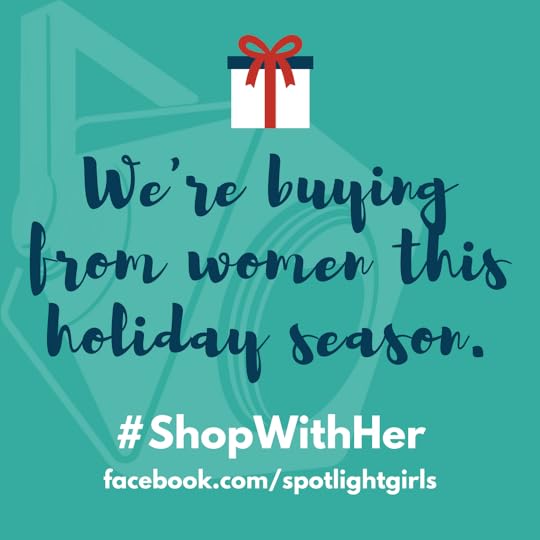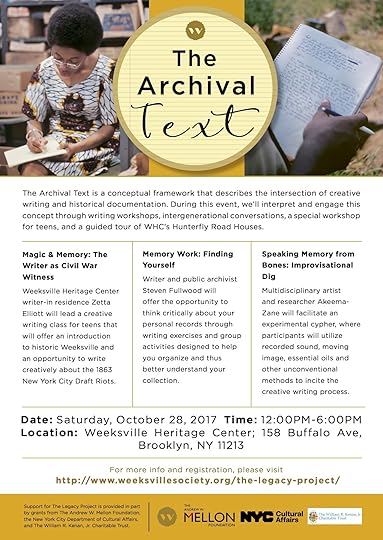Zetta Elliott's Blog, page 27
December 26, 2017
2017 MG & YA Titles by African Americans
2017 is almost over and with help, I’ve put together a list of the middle grade and young adult novels authored by Black writers and published in the US. You can find our 2016 list here. If I’ve missed any titles, please leave them in the comments. We do not include self-published titles for this list since we’re trying to see what US publishers are producing annually. It’s right to celebrate THUG sitting atop the bestseller list, but context matters, too. If 3,000 novels for teens are published in the US each year, how much progress have we really made?
FICTION
One Last Word: Wisdom from the Harlem Renaissance by Nikki Grimes. Bloomsbury USA. Ages 10-14
Allegedly by Tiffany D. Jackson. Katherine Tegen Books. Ages 13+
The Hate U Give by Angie Thomas. Balzer + Bray. Ages 12+
Piecing Me Together by Renee Watson. Bloomsbury. Ages 12+
Ahgottahandleonit by Donovan Mixon. Cinco Puntos. Ages 12–18
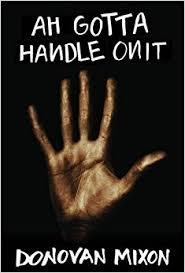
Heels, Heartache & Headlines (Hollywood High) by Ni-Ni Simone and Amir Abrams. Kensington Teen/Dafina. Ages 14–up.
American Street by Ibi Zoboi. Balzer + Bray. Ages 14+
Overturned by Lamar Giles. Scholastic Press. Ages 12+
The End of Oz (Dorothy Must Die), Vol. 3 by Danielle Page. HarperCollins. Ages 14+
The Sky Throne by Chris Ledbetter. Month9Books. Ages 12+
Crossing Ebenezer Creek by Tonya Bolden. Bloomsbury. Ages 13+
The Go-Between by Veronica Chambers. Delacorte Press. Ages 12+
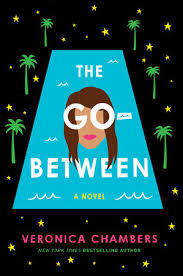
Cleo Edison Oliver in Persuasion Power by Sundee Frazier. Arthur A. Levine Books. Ages 8-12
Out of Wonder: Poems Celebrating Poets by Kwame Alexander, Chris Colderley, Marjory Wentworth. Candlewick. Ages 8-12.
Rise of the Jumbies by Tracey Baptiste. Algonquin. Ages 13-18
Midnight Without a Moon by Linda Williams Jackson. HMH. Ages 10-12
The Harlem Charade by Natasha Tarpley. Scholastic. 8-12
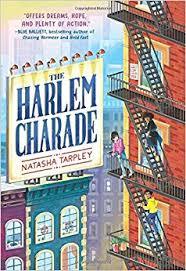
Dork Dairies #12: Tales from a Not-So-Secret Crush Catastrophe by Rachel Renee Russell. Ages 9-13
M.F.K. by Nilah Magruder. Insight Comics. Ages 12+
Tru and Nelle: A Christmas Tale by G. Neri. HMH. Ages 10-12
Dear Martin by Nic Stone. Crown Books for Young Readers. Ages 14+
I Am Alfonso Jones by Tony Medina. Tu Books. YA
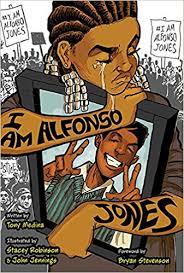
Auma’s Long Run by Eucabeth Odhiambo. Carolrhoda Lab TM. Ages 10-13
Long Way Down by Jason Reynolds. Simon and Schuster. Ages 12+
One Shadow on the Wall by Leah Henderson. Atheneum. Ages 8-12
You Don’t know Me But I Know You by Rebecca Barrow. HarperTeen. YA
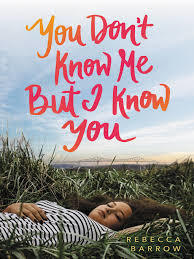
Beasts Made out of Night by Tochi Onyebuchi. Razorbill. YA
Starfish by Akemi Dwan Bowman. Simon Pulse. Ages 12+
Solo by Kwame Alexander and Mary Rand Hess. Blink. YA
The Stars Beneath Our Feet by David Barclay Moore. Knopf. Ages 10+
Akata Warrior by Nnedi Okorafor. Vikings Books for Young Readers. YA
When I Am Through With You by Stephanie Kuehn. Dutton. YA
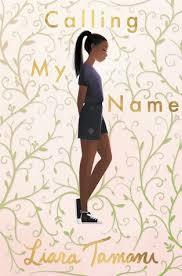
by Liari Tamani
Patina (Track) by Jason Reynolds Atheneum/Caitlyn Dlouhy Books. Ages 10+
Siege of Shadows by Sarah Raughley. Simon Pulse. YA
Reign of Outlaws by Kekla Magoon. Bloomsbury. Ages 8-12.
The Truth of Right Now by Kara Lee Corthron. Simon Pulse. YA
Little & Lion by Brandy Colbert. Little, Brown. YA
 It All Comes Down to This
by Karen English. Clarion. Ages 10-12.
It All Comes Down to This
by Karen English. Clarion. Ages 10-12.Clayton Byrd Goes Underground by Rita Williams-Garcia. Amistad. Ages 9-12
Not Now, Not Ever by Lily Anderson. Wednesday Books. YA
OMG…Is He Also a Witch? by Talia Aikens-Nunez. Central Avenue Publishing. Ages 9-12
Mulatto Girl Aggie, 13: Name on the Ledger by LaKesa Cox. Black Rose Writing.
Miles Morales: Spider-Man by Jason Reynolds. Marvel Press. YA
Mango Delight by Fracaswell Hyman. Sterling Children’s Books. Ages 9-13
Sasha Savvy Loves to Code by Sasha Ariel Alston. Gold Fern Press. Ages 7-10
Jupiter Storm by Marti Dumas. Plum Street Press. Ages 8-12
Gabriela Speaks Out (American Girl) by Teresa E. Harris. Scholastic. Ages 8-12
The Magnificent Mya Tibbs: Spirit Week Showdown by Crystal Allen. Balzer + Bray. Ages 8-12
NONFICTION
How Dare the Sun Rise: Memoirs of a War Child by Sandra Uwiringiyimana and Abigail Pesta. Ages 13+
The Playbook: 52 Rules to Aim, Shoot, and Score in this Game Called Life by Kwame Alexander (HMH)
Little Leaders: Bold Women in Black History by Vashti Harrison. Ages 8-12
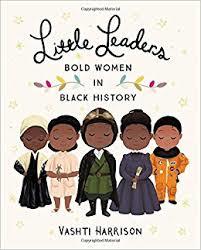
Becoming Kareem: Growing Up On and Off the Court by Kareem Abdul-Jabbar and Raymond Obstfeld ages 10-13
School of Awake: A Girl’s Guide to the Universe by Kidada Jones. Ages 14-18
Pathfinders: the Journeys of 16 Extraordinary Souls by Tonya Bolden. Abrams. Ages 10-14
Now or Never! Fifty-Fourth Massachusetts Infantry’s War to End Slavery by Ray Shepard (Boyds Mill)
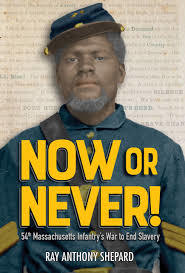
Schomburg: The Man Who Built a Library by Carole Boston Weatherford. Candlewick. Ages 9-12.
Al Roker’s Extreme Weather: Tornadoes, Typhoons and Other Weather Phenomena by Al Roker. HarperCollins. Ages 8-12
December 22, 2017
taking stock
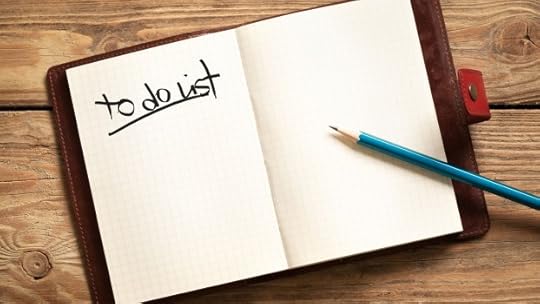 I know that I am more than my productivity, but one way I manage my anxiety is by staying on task. That means I always have a To Do list and I also keep a writing agenda so I know which projects need my attention. 2017 was a difficult year and I spent a lot of time inside my head, dreaming of other worlds—necessary if temporary escapism, though most of the time I was writing about things in the news. Near the top of my current To Do list is: “set new writing agenda for 2018.” In order to do that, I’m looking back at 2017’s agenda, which I followed pretty closely.
I know that I am more than my productivity, but one way I manage my anxiety is by staying on task. That means I always have a To Do list and I also keep a writing agenda so I know which projects need my attention. 2017 was a difficult year and I spent a lot of time inside my head, dreaming of other worlds—necessary if temporary escapism, though most of the time I was writing about things in the news. Near the top of my current To Do list is: “set new writing agenda for 2018.” In order to do that, I’m looking back at 2017’s agenda, which I followed pretty closely.
In January I wrote an essay, “The Perils of Proximity” for the Doris McCarthy Gallery. That same month I self-published The Ghosts in the Castle. In February I pulled some educator friends together to have “A Talk with Teachers: Revisiting James Baldwin’s Vision for Education.” I also started writing for a curriculum company that wound up buying NONE of my stories. But trying to satisfy them led me to produce Mother of the Sea, North/South (a dystopian novella), and a short story called “The Ghosts in her Bones.” In May I wrote a poem, “You, Too, Can Fly,” for an anthology edited by Cheryl and Wade Hudson of Just Us Books; they sold the project to Crown/Random House, and We Rise, We Resist, We Raise Our Voices will be published in September 2018. In June I wrote a new picture book story about a little girl understanding her aunt’s transition; fully expect to self-publish that one! By mid-July I finished The Return and stupidly asked my agent to send it out; no response, as expected, so that YA novel is top of the list to self-publish in 2018. Started work on The Dragon Thief but then Charlottesville happened and I wrote The Phantom Unicorn instead. I wrote Benny Doesn’t Like to Be Hugged a couple of years ago but self-published it in October. The NY Times asked me to write an op-ed but then didn’t want my essay, “Nice Is Not Enough,” so Edi published it as part of her When Women Speak series in November. I finally finished The Dragon Thief earlier this week, and then wrote an essay on Logan for Smugglivus over at The Book Smugglers; that will be published in early January.
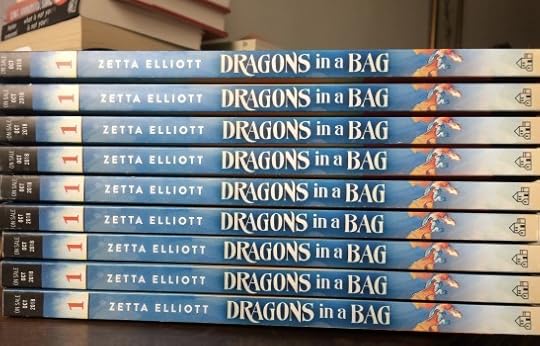 Am I done for this year? I don’t know. I spent this morning chasing down yet another outstanding payment, so I’m VERY clear that producing more doesn’t necessarily affect my bottom line. Does it keep me sane? Or does writing continuously keep me from being fully present in my world? I don’t know. But I’ve been very emotional this week, probably because I get the blues whenever I finish a big project. One way to make sure my funk doesn’t last too long is to dive into another book. For now I’ll keep reading and watching Netflix, and on Xmas Eve I’ll watch Scrooge and hope the bells on Xmas morning remind me that we can always start over—even at the very end of the year.
Am I done for this year? I don’t know. I spent this morning chasing down yet another outstanding payment, so I’m VERY clear that producing more doesn’t necessarily affect my bottom line. Does it keep me sane? Or does writing continuously keep me from being fully present in my world? I don’t know. But I’ve been very emotional this week, probably because I get the blues whenever I finish a big project. One way to make sure my funk doesn’t last too long is to dive into another book. For now I’ll keep reading and watching Netflix, and on Xmas Eve I’ll watch Scrooge and hope the bells on Xmas morning remind me that we can always start over—even at the very end of the year.
December 20, 2017
rage is pain
 I was angry yesterday. I’m just getting over a bad cold and I finished The Dragon Thief on Monday, so I’m bone tired and that always makes me emotional. I figured I’d binge-watch the new season of Broadchurch to relax but the case they were trying to solve was the rape of a middle-aged woman at her best friend’s birthday party [spoilers ahead]. And the show did a really good job showing rape culture: several suspects have pornographic images of women displayed at work, teenage boys share porn at school, men stalk and harass their female employees, they cheat on their wives, they try to coerce young, subordinate women into rough sex, they steal intimate photos of underage girls and share them on social media, husbands install spyware to secretly monitor their wives. Early on in the season the male detective admits, “It makes me ashamed to be a man.” Yet when a despondent father who lost his son attempts suicide, I found myself shedding quite a few tears—and then I was angry at myself for falling for that narrative bait and switch. HE was not the victim, and because he didn’t succeed, his wife and two daughters were then left to a) care for him, and b) wonder why he didn’t think they were worth living for. The ending was totally depressing—one young man grooming a vulnerable teen to become a serial rapist—but that’s real. That’s how misogyny continues to thrive
I was angry yesterday. I’m just getting over a bad cold and I finished The Dragon Thief on Monday, so I’m bone tired and that always makes me emotional. I figured I’d binge-watch the new season of Broadchurch to relax but the case they were trying to solve was the rape of a middle-aged woman at her best friend’s birthday party [spoilers ahead]. And the show did a really good job showing rape culture: several suspects have pornographic images of women displayed at work, teenage boys share porn at school, men stalk and harass their female employees, they cheat on their wives, they try to coerce young, subordinate women into rough sex, they steal intimate photos of underage girls and share them on social media, husbands install spyware to secretly monitor their wives. Early on in the season the male detective admits, “It makes me ashamed to be a man.” Yet when a despondent father who lost his son attempts suicide, I found myself shedding quite a few tears—and then I was angry at myself for falling for that narrative bait and switch. HE was not the victim, and because he didn’t succeed, his wife and two daughters were then left to a) care for him, and b) wonder why he didn’t think they were worth living for. The ending was totally depressing—one young man grooming a vulnerable teen to become a serial rapist—but that’s real. That’s how misogyny continues to thrive  over generations. So I woke up yesterday feeling a bit out of sorts, but figured I had enough energy to run a few errands. On my way out of a shopping center I passed an elderly man perched on a ledge, and I didn’t want to make eye contact because I knew he was begging for change even if I couldn’t understand what he was saying in Spanish. And I lugged my bulky bag down the stairs to the subway, grumbling about “this place”—as in, “What’s WRONG with this place?” Why are senior citizens picking cans from the trash? Why are grandparents begging at the mall? I’m still looking for a way out, even though I know it’s cowardly to flee instead of staying to fight. There was drama at the post office because the automated machine swallowed my postage and while I was waiting for a supervisor, the man who used the machine after me took my postage—even though he must have noticed it wasn’t for the amount he paid. But I was running out of steam by then so just came home and chatted with a neighbor in my building before collapsing on the couch. I tried to decide if my neighbor should go on my very short list of “good guys.” That used to be how I’d redirect myself—“Don’t focus on the assholes; think about ‘the good ones.'” But they’re harder to find these days. I started watching Season 2 of The Crown and quickly realized THAT was a mistake. More “men behaving badly”—and more hurt and humiliated women “making the best of it.” So I turned it off and finally sat down to write my guest post about Logan. And, as expected, I
over generations. So I woke up yesterday feeling a bit out of sorts, but figured I had enough energy to run a few errands. On my way out of a shopping center I passed an elderly man perched on a ledge, and I didn’t want to make eye contact because I knew he was begging for change even if I couldn’t understand what he was saying in Spanish. And I lugged my bulky bag down the stairs to the subway, grumbling about “this place”—as in, “What’s WRONG with this place?” Why are senior citizens picking cans from the trash? Why are grandparents begging at the mall? I’m still looking for a way out, even though I know it’s cowardly to flee instead of staying to fight. There was drama at the post office because the automated machine swallowed my postage and while I was waiting for a supervisor, the man who used the machine after me took my postage—even though he must have noticed it wasn’t for the amount he paid. But I was running out of steam by then so just came home and chatted with a neighbor in my building before collapsing on the couch. I tried to decide if my neighbor should go on my very short list of “good guys.” That used to be how I’d redirect myself—“Don’t focus on the assholes; think about ‘the good ones.'” But they’re harder to find these days. I started watching Season 2 of The Crown and quickly realized THAT was a mistake. More “men behaving badly”—and more hurt and humiliated women “making the best of it.” So I turned it off and finally sat down to write my guest post about Logan. And, as expected, I 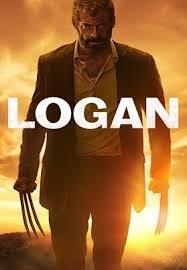 was sobbing by the time I got to the end. I wiped my tears, blew my nose, and immediately started to write but then had to stop, take my glasses off, and really let loose. I usually have two good cries per year but I’m not sure I’ve had one since the election. Instead I stayed busy and wrote and wrote and wrote…I need to set a new writing agenda for 2018 but I crossed a lot of projects off my list this year because Rome is burning. Everything feels urgent. My inbox keeps filling up and I’m grateful that people want to book me for 2018 but it’s hard to focus on the future. I want to disappear for a while. I usually try to write over the holidays. Maybe this year I’ll tackle that unfinished dystopian novella. I’ve written the half told from the female twin’s point of view—now it’s her jerk brother’s turn. Can I write without projecting all my rage/pain onto that male character? I don’t know. Guess there’s only one way to find out…
was sobbing by the time I got to the end. I wiped my tears, blew my nose, and immediately started to write but then had to stop, take my glasses off, and really let loose. I usually have two good cries per year but I’m not sure I’ve had one since the election. Instead I stayed busy and wrote and wrote and wrote…I need to set a new writing agenda for 2018 but I crossed a lot of projects off my list this year because Rome is burning. Everything feels urgent. My inbox keeps filling up and I’m grateful that people want to book me for 2018 but it’s hard to focus on the future. I want to disappear for a while. I usually try to write over the holidays. Maybe this year I’ll tackle that unfinished dystopian novella. I’ve written the half told from the female twin’s point of view—now it’s her jerk brother’s turn. Can I write without projecting all my rage/pain onto that male character? I don’t know. Guess there’s only one way to find out…
Wrote most of my guest post last night but will finish that up today and share the link once it’s live—even if it is a hot mess. A friend’s coming over to bake tonight, and I’ve got Xmas tunes playing with my little silver tree glowing nearby. Haven’t been craving sweets lately—didn’t even get cake as a reward for finishing The Dragon Thief! But maybe I’ll get some pizza today and find something “light” on Netflix that makes me feel a bit better about the world…
December 14, 2017
the most wonderful time of the year
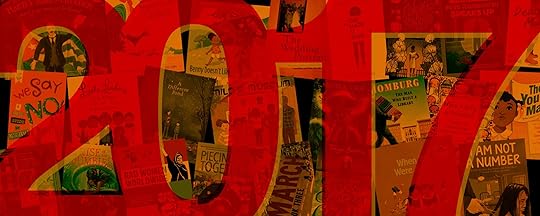 Christmas is coming! A week ago I wasn’t feeling very festive, but then I turned on the holiday tunes and started baking my Christmas cookies; a friend gave me a poinsettia—and then it snowed! I’m still writing furiously, trying to finish The Dragon Thief (which has now surpassed 30K words), but I’m deliberately making time for the holiday traditions that make me happy. Then yesterday I went online and discovered that my books made two year-end lists! It can be difficult to see lists of the “best” books of the year; if they aren’t lily-white, they often only include traditionally published books. But when Prof. Ebony Elizabeth Thomas at Penn GSE puts together her annual list, she includes indie titles and uses a specific set of considerations:
Christmas is coming! A week ago I wasn’t feeling very festive, but then I turned on the holiday tunes and started baking my Christmas cookies; a friend gave me a poinsettia—and then it snowed! I’m still writing furiously, trying to finish The Dragon Thief (which has now surpassed 30K words), but I’m deliberately making time for the holiday traditions that make me happy. Then yesterday I went online and discovered that my books made two year-end lists! It can be difficult to see lists of the “best” books of the year; if they aren’t lily-white, they often only include traditionally published books. But when Prof. Ebony Elizabeth Thomas at Penn GSE puts together her annual list, she includes indie titles and uses a specific set of considerations:
In selecting the top books of 2017 for young readers, Thomas highlights authors and illustrators whose work deals with issues like gender, race, ethnicity, religion, sexuality, and socioeconomic class in ways that are real and empathetic.
“When a children’s publisher decides to release a book, or a teacher assigns a novel, they are making a choice that will resonate for decades,” Thomas said. “That’s because stories help kids understand who they are and who they can be. These stories matter not only for the members of the groups they portray. They also show members of other groups a view of life they might not otherwise see.”
You can watch a video from the Penn GSE team here. The banner image above accompanies the year-end list from M Is for Movement, a blog founded by four activist/authors. They explained the reasoning behind their list:
…the Trump campaign, election, and the racism, sexism, xenophobia and hate it has unleashed has highlighted the need to address social justice issues with our children. But a movement was already in the making, as many of these books were in the works even before Trump becoming president seemed a real threat. And of course many of the authors and illustrators who launched their books this year are people who have been tilling this ground for years. In either case, our folks have been hard at work, and we didn’t want to even try to make a comprehensive list of all the great social justice themed books that came out this year*. So instead, we asked M is for Movement editorial board members, other authors, illustrators, librarians, educators, and scholars “what were your favorite social justice and activist themed children’s books to come out this year?”
 I don’t have kids and I don’t review books on this blog, so I drew a blank when “the M team” asked for my 2017 picks. I recommended Deborah Menkart of Teaching for Change and Social Justice Books, and was honored to find that one of her picks was Milo’s Museum! Two other books of mine were included, Mother of the Sea and Benny Doesn’t Like to Be Hugged, which is astonishing—and humbling, and heartening. These same author/activists participated in a social justice children’s book fair last weekend and over a thousand people came out! I’m not sure we could replicate that here on the east coast, but there is DEMAND for books like ours, and I love that these radical kid lit creators aren’t waiting for bookstores or publishers or mainstream review outlets to get on board.
I don’t have kids and I don’t review books on this blog, so I drew a blank when “the M team” asked for my 2017 picks. I recommended Deborah Menkart of Teaching for Change and Social Justice Books, and was honored to find that one of her picks was Milo’s Museum! Two other books of mine were included, Mother of the Sea and Benny Doesn’t Like to Be Hugged, which is astonishing—and humbling, and heartening. These same author/activists participated in a social justice children’s book fair last weekend and over a thousand people came out! I’m not sure we could replicate that here on the east coast, but there is DEMAND for books like ours, and I love that these radical kid lit creators aren’t waiting for bookstores or publishers or mainstream review outlets to get on board.
Okay—time to get back to writing! I keep thinking the novel is almost done, and then it just keeps going…I stocked up on soup this week, which is good because we’re expecting more snow. Time to hunker down, write, bake, and assemble my own year-end list of African American YA/MG novels!
November 29, 2017
love for & from School Library Journal
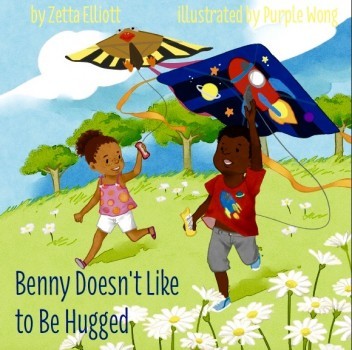 A couple of years ago I wrote a post praising School Library Journal for starting a review column for self-published books. It was a progressive—even radical—decision in an industry that regularly dismisses and excludes indie authors, many of whom are filling the representation gap with their inclusive titles. About a month ago I got a request from the non-fiction editor at SLJ; when I explained that my picture book wasn’t non-fiction, Della kindly offered to share the review copy with the picture book editor. Today, that same editor emailed me to share the good news—BENNY DOESN’T LIKE TO BE HUGGED has earned a starred review! Here’s part of the review, which will appear in the December issue:
A couple of years ago I wrote a post praising School Library Journal for starting a review column for self-published books. It was a progressive—even radical—decision in an industry that regularly dismisses and excludes indie authors, many of whom are filling the representation gap with their inclusive titles. About a month ago I got a request from the non-fiction editor at SLJ; when I explained that my picture book wasn’t non-fiction, Della kindly offered to share the review copy with the picture book editor. Today, that same editor emailed me to share the good news—BENNY DOESN’T LIKE TO BE HUGGED has earned a starred review! Here’s part of the review, which will appear in the December issue:
The much-needed message is one of loving others for what makes them unique. In a time when emphasis on social emotional learning is a growing focus in schools and childcare facilities, narratives that model and encourage empathy are increasingly important. Carefully and lovingly crafted by Elliott and Wong, this book includes a beautifully diverse cast of characters…VERDICT: There’s an audience of children ready for this title in every library and classroom.
Most people in the kid lit community just act like self-published authors don’t exist—they try to make us invisible in order to preserve the status quo. So it’s empowering and gratifying to have a major review journal say, “We see you. We see the work that you’re doing, and we appreciate your contribution to our community.” Thanks, SLJ!
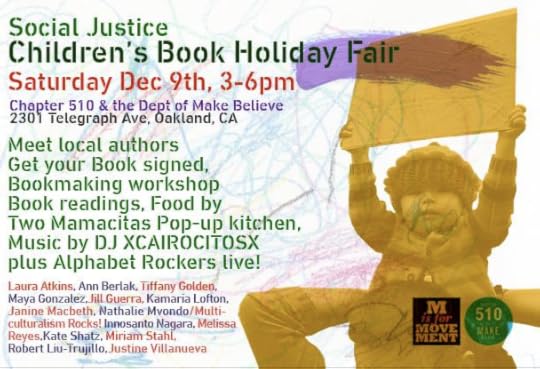 Indie authors are producing some outstanding books for kids, but it’s hard to get the word out. If you’re in the Bay Area, check out the Social Justice Children’s Book Holiday Fair that will feature a dozen indie authors and their inclusive books. I won’t be there but Multiculturalism Rocks! blogger Nathalie Mvondo will be selling some of my books at her pop-up bookshop! Nathalie has an amazing selection of diverse books, many by indie authors, and I’m grateful that she’s making my books visible (many traditional bookstores refuse to carry self-published books). Lastly, I need to share another innovation from the west coast: the dynamic duo at Spotlight: Girls has produced an awesome, free holiday gift guide that shines a light on 200 women entrepreneurs and artists—including me! If the endless reports of assaults against women are getting you down, support those who are channeling their rage, joy, and creativity into products and services that engage and uplift…#ShopWithHer!
Indie authors are producing some outstanding books for kids, but it’s hard to get the word out. If you’re in the Bay Area, check out the Social Justice Children’s Book Holiday Fair that will feature a dozen indie authors and their inclusive books. I won’t be there but Multiculturalism Rocks! blogger Nathalie Mvondo will be selling some of my books at her pop-up bookshop! Nathalie has an amazing selection of diverse books, many by indie authors, and I’m grateful that she’s making my books visible (many traditional bookstores refuse to carry self-published books). Lastly, I need to share another innovation from the west coast: the dynamic duo at Spotlight: Girls has produced an awesome, free holiday gift guide that shines a light on 200 women entrepreneurs and artists—including me! If the endless reports of assaults against women are getting you down, support those who are channeling their rage, joy, and creativity into products and services that engage and uplift…#ShopWithHer!
November 14, 2017
all in the family
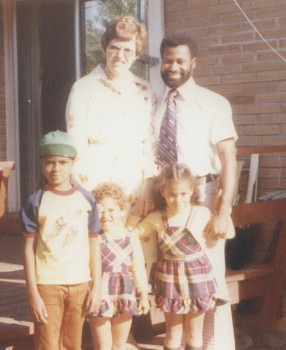 Last month I visited Prof. Roni Natov’s class at Brooklyn College to talk about the representation of families in my books for young readers. I come from a “non-traditional” family. My parents were a mixed-race couple; my mother identifies as White, though she has African American ancestors. Their marriage lasted from 1967 to 1981, and during that time they adopted my older brother Denzil; he was my father’s first cousin and was “brought up” from the Caribbean to have “a better life” as part of our nuclear family. But the adoption was a disaster; my brother was physically abused by my father—who had been abused as a boy himself. Denzil repeatedly ran away and was finally returned to his birth mother (my father’s aunt) in the Caribbean. My parents split up a couple of years later when my father cheated on my mother with a college sweetheart and from that point onward, my family became something very far from the norm. My older sister and I moved with my mother into a townhouse just
Last month I visited Prof. Roni Natov’s class at Brooklyn College to talk about the representation of families in my books for young readers. I come from a “non-traditional” family. My parents were a mixed-race couple; my mother identifies as White, though she has African American ancestors. Their marriage lasted from 1967 to 1981, and during that time they adopted my older brother Denzil; he was my father’s first cousin and was “brought up” from the Caribbean to have “a better life” as part of our nuclear family. But the adoption was a disaster; my brother was physically abused by my father—who had been abused as a boy himself. Denzil repeatedly ran away and was finally returned to his birth mother (my father’s aunt) in the Caribbean. My parents split up a couple of years later when my father cheated on my mother with a college sweetheart and from that point onward, my family became something very far from the norm. My older sister and I moved with my mother into a townhouse just 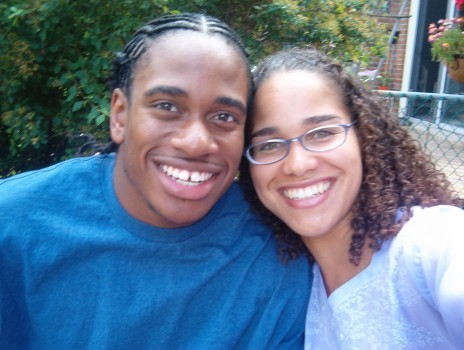 inside Toronto’s city limits, and we saw our father on weekends. After a string of girlfriends—most of whom had kids of their own—my father settled down with a Jamaican woman; she had two kids from previous relationships, and with my father she had two more kids. So I went from being the baby of the family to having younger step-siblings and half-siblings. In high school I was occasionally called “Cosby kid.” I certainly didn’t look like Lisa Bonet, but for my White friends—and for me, as well—that show was the first time they’d seen a large Black family whose members had varying skin tones. Of course, in my family, it wasn’t just about genetics; we looked different because we were a collage, different people cut and pasted into different
inside Toronto’s city limits, and we saw our father on weekends. After a string of girlfriends—most of whom had kids of their own—my father settled down with a Jamaican woman; she had two kids from previous relationships, and with my father she had two more kids. So I went from being the baby of the family to having younger step-siblings and half-siblings. In high school I was occasionally called “Cosby kid.” I certainly didn’t look like Lisa Bonet, but for my White friends—and for me, as well—that show was the first time they’d seen a large Black family whose members had varying skin tones. Of course, in my family, it wasn’t just about genetics; we looked different because we were a collage, different people cut and pasted into different 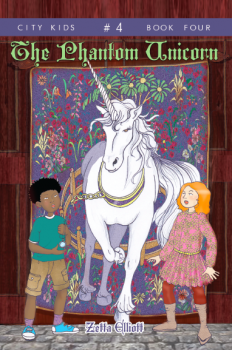 configurations in different moments. When my father left for the US, I stayed in touch with my half-siblings but lost touch with my step-siblings. My dad married again and I’ve just recently reconnected with my older stepsister from that marriage (which ended in divorce a few years later). There were certainly times in my life when I was embarrassed by my unwieldy, unusual family; I dreaded having to explain just how I was related to each sibling, why certain ones no longer spoke to me, why we didn’t look alike. But when I presented on Black families at Brooklyn College last month, I talked about how centuries of enslavement impacted the Black family, leading to innovation and improvisation and a more progressive understanding of kinship. We aren’t bound by blood to every person we consider family. And sometimes the folks who share our DNA aren’t worth keeping close. I try to represent the complexity of Black families in my books for young readers. At the Brooklyn Museum Children’s Book Fair last weekend, a Black woman picked up The Phantom Unicorn and read the first two lines of the summary on the
configurations in different moments. When my father left for the US, I stayed in touch with my half-siblings but lost touch with my step-siblings. My dad married again and I’ve just recently reconnected with my older stepsister from that marriage (which ended in divorce a few years later). There were certainly times in my life when I was embarrassed by my unwieldy, unusual family; I dreaded having to explain just how I was related to each sibling, why certain ones no longer spoke to me, why we didn’t look alike. But when I presented on Black families at Brooklyn College last month, I talked about how centuries of enslavement impacted the Black family, leading to innovation and improvisation and a more progressive understanding of kinship. We aren’t bound by blood to every person we consider family. And sometimes the folks who share our DNA aren’t worth keeping close. I try to represent the complexity of Black families in my books for young readers. At the Brooklyn Museum Children’s Book Fair last weekend, a Black woman picked up The Phantom Unicorn and read the first two lines of the summary on the 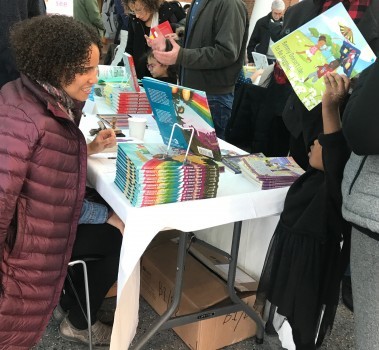 back cover: “A boy with two mothers? I definitely need this book!” A lot of kids don’t get to see their family represented in a book, and I try to represent different family configurations in my stories. But will those books reach the kids who need them? I’m always struck by members of the kid lit community who only acknowledge the books I’ve published traditionally. To them, my indie titles don’t count. They know racism in publishing is real, but they nonetheless refuse to recognize that quality books could come through other channels. To me, that’s like looking at my family and saying Denzil isn’t my “real” brother because he’s adopted; or that I have one sister rather than half a dozen because only the biological children from my parents’ first marriage count. My indie titles sold really well at the museum book fair and as soon as I finish The Dragon Thief, I’ll start planning a launch party for The Phantom Unicorn. At the end of the day, the people who are looking for me find me. I had several educators come up to my table and thank me for writing Benny Doesn’t Like to Be Hugged. It wasn’t available for purchase (that little girl desperately wanted to take my only copy home with her) but at least more people now know it exists. And we’ve only got one review so far, but it’s stellar. I received two invitations to present in 2018 since launching The Phantom Unicorn yesterday, and that’s encouraging. Families like mine are no longer the exception—we’re becoming the norm. Hopefully more gatekeepers will recognize that fact and embrace stories that reflect the “new” reality.
back cover: “A boy with two mothers? I definitely need this book!” A lot of kids don’t get to see their family represented in a book, and I try to represent different family configurations in my stories. But will those books reach the kids who need them? I’m always struck by members of the kid lit community who only acknowledge the books I’ve published traditionally. To them, my indie titles don’t count. They know racism in publishing is real, but they nonetheless refuse to recognize that quality books could come through other channels. To me, that’s like looking at my family and saying Denzil isn’t my “real” brother because he’s adopted; or that I have one sister rather than half a dozen because only the biological children from my parents’ first marriage count. My indie titles sold really well at the museum book fair and as soon as I finish The Dragon Thief, I’ll start planning a launch party for The Phantom Unicorn. At the end of the day, the people who are looking for me find me. I had several educators come up to my table and thank me for writing Benny Doesn’t Like to Be Hugged. It wasn’t available for purchase (that little girl desperately wanted to take my only copy home with her) but at least more people now know it exists. And we’ve only got one review so far, but it’s stellar. I received two invitations to present in 2018 since launching The Phantom Unicorn yesterday, and that’s encouraging. Families like mine are no longer the exception—we’re becoming the norm. Hopefully more gatekeepers will recognize that fact and embrace stories that reflect the “new” reality.
November 11, 2017
Nice Is Not Enough: a Conversation with Laura Atkins
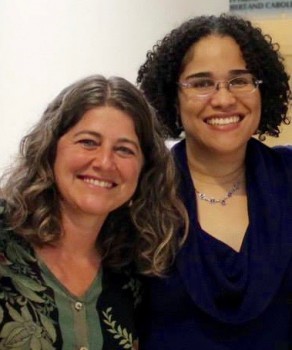 My essay, “Nice Is Not Enough,” has been published as part of librarian/blogger Edith Campbell’s “When Women Speak” series. Author/editor Laura Atkins and I have been friends for close to twenty years. Since this is such a sensitive subject, we decided to keep the conversation going here on my blog.
My essay, “Nice Is Not Enough,” has been published as part of librarian/blogger Edith Campbell’s “When Women Speak” series. Author/editor Laura Atkins and I have been friends for close to twenty years. Since this is such a sensitive subject, we decided to keep the conversation going here on my blog.
In the first draft of my essay I quipped, “Some of my best friends are White women!” And, of course, half my family identifies as White. But just being related to or caring for a person of color doesn’t automatically make White people anti-racist. I grew up in a majority-White community outside of Toronto and when I moved to Brooklyn at age 21, I vowed I would never live like that again. I didn’t think I’d make White friends, either—it was just too much work for too little reward. But then we met when I submitted my stories to Lee & Low; I’d never gotten such a warm, encouraging response from an editor and I knew right away that you were different. Why? How do we clone you, Laura? How have you been able to move past the defensiveness and denial that comes with White fragility?
I noticed that quip too, and thought about our friendship. I hold you as one of my best friends, as well as someone I admire and aspire to be like in the world. You’ve pushed me to be more vulnerable and open, stepping aside and trying to listen more. But I don’t feel like I’ve got it down at all. In some ways it’s like taking the red pill in the film The Matrix. As a White person who has made an effort to listen to POC friends about their experiences, and also taken part in an equity circle at my daughter’s school, I’ve experienced a shift as I’ve just started to recognized what White privilege is, how my life is defined by it, and how differently POC move through, and are treated by, our society. Mostly, I’m 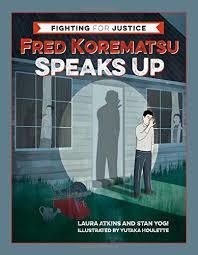 aware of how much I DON’T know.
aware of how much I DON’T know.
Here’s an example of how I’ve navigated a situation based around my Whiteness. I co-wrote a book with Stan Yogi called Fred Korematsu Speaks Up. At the end of that process, Stan decided he wanted to move onto other things, and our publisher Heyday asked if I would write the following books in the series by myself. The first one is a biography of Biddy Mason, an enslaved woman who won her freedom through the courts in Los Angeles, worked as a midwife and doctor’s assistant to save money, and eventually used her wealth made through property to be a community activist and philanthropist.
I felt unsure about doing this by myself, as I’m aware not just of the problems with cultural appropriation, but also that books about slavery have been particularly fraught in the children’s book world. I’m also aware that more White people have been writing books about Black people in particular, within a landscape where people are not being able to get published writing books about their own communities. As this infographic from Reflection Press show, for there to be accurate representation in our children’s book world, with 4711 total books published, we would need 1511 more by POC/Indigenous creators. I wondered how I would feel, out in the world, talking about and representing this book when it was done. When I asked you, you gave me your sign off, saying you thought I’d do it better than most.
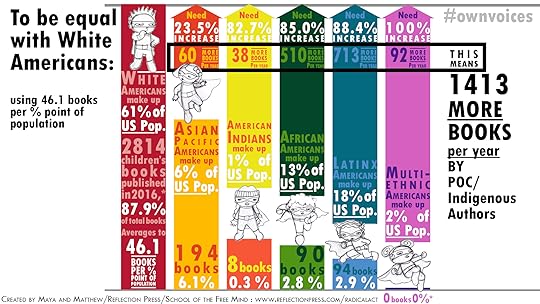 I talked to other POC friends to get their thoughts, and had other responses that were not comfortable with the idea of writing this book on my own. And I felt my White fragility – some defensiveness. But I made the effort to sit with what I’d heard, which really reinforced what I was already feeling – that I didn’t WANT to write this book by myself. I knew that I would always be imagining myself into the experience, not just of an enslaved person in the 19th century (we’re all going to be imagining ourselves back into a distant past), but also of someone dealing with institutions of white supremacy, racism and oppression. While slavery has been abolished in the United States, those systems persist in different ways. And as a White woman, I’d be trying to put myself into those shoes. It just didn’t feel right – doesn’t feel right. I am grateful to Maya for what she said, and that she respected me enough to be so direct with me, not worrying about my White fragility.
I talked to other POC friends to get their thoughts, and had other responses that were not comfortable with the idea of writing this book on my own. And I felt my White fragility – some defensiveness. But I made the effort to sit with what I’d heard, which really reinforced what I was already feeling – that I didn’t WANT to write this book by myself. I knew that I would always be imagining myself into the experience, not just of an enslaved person in the 19th century (we’re all going to be imagining ourselves back into a distant past), but also of someone dealing with institutions of white supremacy, racism and oppression. While slavery has been abolished in the United States, those systems persist in different ways. And as a White woman, I’d be trying to put myself into those shoes. It just didn’t feel right – doesn’t feel right. I am grateful to Maya for what she said, and that she respected me enough to be so direct with me, not worrying about my White fragility.
So I went back to Heyday and proposed the idea of finding a different author to co-write each book, finding someone whose lived experience connects to the story being told. Heyday, a small non-profit regional publisher, agreed (I’m not sure a more mainstream publishers would have). I am co-writing the next book with Arisa White, an Oakland-based poet. And I am SO grateful for this relationship and process. Arisa and I have partnered, talking through all parts of Biddy Mason’s story, including writing about her as an individual but also about slavery, for children. We’ve developed trust and friendship, and it’s been great, and also challenging, to collaborate on this tricky project. Arisa expands my world as a poet, and someone connected to the Bay Area writing community in many ways. We’ve also enlisted several outside readers, including a scholar who wrote her PhD, in part, on the representation of slavery in books for children. We’ve asked author friends, teachers and experts to give us feedback on our draft(s). This is a takes-a-village book, as it should be.
To me, this collaborative model, which includes partnership and equality of voice and process – it’s a way forward. I feel like we are trying to walk the talk, to collaborate while wading through some treacherous but important waters. And I am learning ALL the time. I’m sure I’ll keep making mistakes as well. I just try to do the best I can, listen and be open, and get out of the way while also lending my skills and amplification when they seem to be useful.
In a recent interview with Sam Bloom over at RWW, Sarah Park Dahlen offered some critical advice for equity advocates: “Know that [your work is] important. Know that it’s hard. And know that you’re not alone. Find a community or communities that will work alongside you, that will support you, that will build you up and give you opportunities.” Finding community has been so important for me as an indie author/scholar, especially when most gatekeepers I encounter close the door over and over again. I think some people might be surprised by how many White women are part of my community; like you, they’re radical allies who aren’t afraid to speak out against White supremacy and White privilege. Historically, radical White women have always aligned themselves with Black women, but they are rare. What I find particularly demoralizing is the tendency of some people of color to rush to defend their White friends—even when they know the critique is structural and not personal. That said, I almost never read the comments section; it’s not a productive space for meaningful conversation, I don’t think, and some folks really let loose with hateful, hurtful remarks. You read the comments on Amy Cheney’s post. What did you find there?
Yeah, those comments sections can be intense. In the response to the Amy Cheney post, I saw… a continued shift towards protecting Whiteness, questions about whether the post was “calling in” versus “calling out.” Complex issues raised, such a Thi Bui’s feeling that the post was a “take down” and “utterly mean and unnecessary.” I have enormous respect for Thi, as an author, activist, educator, and her words felt particularly important.
For me, Yuyi Morales gave some deep and reflective thoughts, showing how much of a process this is, and giving ideas that she’s gained recently for how we might move forward. She raised the importance of having “taboo conversations” in the children’s book world. She asks, “How can we create the spaces for the often unheard voices to break up the silence, to open up their hearts and name the pain, and even cry when things hurt?” And she wrote, “We hardly transform ourselves by going alone to the mountain and asking for insight; instead we do it by moving and recreating ourselves from a place of individual power and into a place of connection with the many others. I want to think that what we need is a process in which, yes, we might learn to take care of our wounds in private first, but only to become strong enough to bring it to light so that we can make significant changes to our world.”
We’ve been at many conferences before, and I’ve heard how you and others feel like we keep having the same conversations, and that POC/Indigenous/LGBQTI people are looked to for support and education. I appreciate how Amy shifted this in her column, saying that White people need to do this work ourselves. It’s HARD work, and there aren’t roadmaps for changing behaviors. People like Robin diAngelo are great – I’d recommend her writing and videos to people who really want to learn more about White privilege and fragility.
I particularly liked this video from the BBC showing NFL players Jason Bell and Osi Umenyiora addressing the recent protests. Bell talks about how players in locker rooms are used to having uncomfortable conversations with “guys from all walks of life.” He says you start to get used to those kinds of conversations. “You’re not scared of being uncomfortable.” “If more people in the United States of America could have those uncomfortable conversations, there would be change.” Umenyiora then gives a powerful description of our nation’s history of dissent. He says that the founding fathers felt that “[t]he status quo for us is unacceptable, we’re going to do something,” and then made freedom of speech a pillar of our country. And, he says, we now have NFL players looking at racial inequalities in our country, and being criticized for speaking up. “The country was born out of protest.” What if White folks could be with these uncomfortable conversations, and recognize that dissent is a key part of our nation, as is racist oppression? It’s way past time to center the voices of people oppressed in our nation’s history.
I do wish White people, in particular, would stay with the discomfort and go deeper. That defensiveness shuts down the conversation, and as Amy said, usually many people gather around to support the White person who feels hurt or threatened rather than talking about the damage caused by the book in question. If we’re going to move forward, we need to create spaces where people can talk and listen, openly and with vulnerability, staying present through the discomfort to be part of a real conversation. There are many of us well-meaning White folks who want to create books for kids that include and speak to ALL kids in this country. So many good intentions. But without a willingness to really engage with the inequity and underlying racism that underpins our nation’s systems, including mainstream children’s publishing, change just isn’t going to happen. As my agent Tricia Lawrence said to me recently, “We have to do better.”
You were the first to read my essay—aside from all the White women editors who rejected it—and you suggested I reconsider my conclusion. In my original essay—in the notes, really—I shared a conversation I had with my radical Black feminist performance artist/poet/scholar friend Gabrielle Civil. I told her I was looking for a way to reframe White women as victimizers and not just victims. “We could just say, ‘WBM’ and it would operate as a kind of shorthand,” I proposed (the same way my Black women friends on Facebook caption Trump catastrophe articles with “53%”). But when I told Gabrielle what WBM stood for—White Bitch Mafia—she balked. “Absolutely not,” she said without even cracking a smile. I rarely use the “b-word” and that’s why it’s so powerful and provocative to me; I don’t use it as a term of endearment so it only comes out of my mouth when I’m referring to a woman who’s deliberately acting with malice and/or selfish disregard for others. The OED defines the mafia as “a group regarded as exerting a hidden sinister influence.” And, of course, the members of that group share in the rewards of their unethical enterprise. The problem isn’t that White women are inherently evil. The real problem is dominance and denial—their refusal to see themselves operating as a group to harm other groups, and their insistence that intention matters more than impact. We hear the word “collusion” so often these days; we could also talk about complicity. But mostly I want accountability. How do we achieve that?
Wow, I wish there was an answer to that. Or that I had one. First, people would have to be willing to listen. That happens so rarely. With the A Fine Dessert controversy, author Emily Jenkins seemed able to hear the criticisms, apologized and ended up donating her royalties to We Need Diverse Books (WNDB). It’s funny how just those actions seem so radical, since it’s rare for people to publicly reflect and respond to criticism. Daniel Handler apologized in a tweet for the racist jokes he made during the National Book Awards, and he donated money to WNDB. Though at the time I thought, why isn’t he having a bigger conversation about this. It’s fine to donate money, but that’s not so hard when you’re a hugely successful author. What I’d really like to see at moments like that is for people to talk openly – about the publishing process, about how decisions get made, what gets acquired and what doesn’t, how books are vetted.
It seems crazy to me that publishers don’t do more to be transparent, and to get responses as books are in process. Due diligence. I know from our conversations that both of us check with multiple people when working on a book that’s got historical/cultural content outside of our knowledge base. And frankly, even if someone is writing from an insider’s perspective, there are so many different points of view and experiences in this world. It just makes sense to check things out.
I started my publishing career at Children’s Book Press, where there was a grassroots engagement with community, and books came out of a collaborative process. In my later experience working in publishing – at Orchard Books and Lee & Low where I was an editor, but also being part of the larger New York publishing scene – I just didn’t see much transparency. Big publishers can seem so ossified and slow to move and change. They also serve particular markets and goals.
I don’t know if I see accountability happening in publishing. As my sister said she learned when she took an anti-racism class at social work school, most people who say they are anti-racist activists stop when it means they have to give something up themselves. The only way inequities in the publishing industry are going to shift is for White people to give up power and positions to make room for other people. It’s hard to imagine that happening.
As you say in your essay, “If social justice isn’t at the center of the children’s literature community, why would anyone assume that kid lit creators would preside over a more just world?” Children’s books are mostly produced in a Capitalist system that’s oriented around profit and maintaining the status quo. My hope lies in the grassroots indie publishing efforts that are creating so many fantastic children’s books, and not centering corporate interests, profit or the individualism our nation so fetishizes. A few of the awesome Bay Area children’s book creators that I know of include Ann Berlak, Aya de Leon, Maya Gonzalez and Matthew Smith, Janine Macbeth, Laurin Mayeno, Innosanto Nagara, Robert Trujillo, Justine Villanueva and so many more (lots are part of the Activist children’s book Facebook group) – all producing their own books, empowering themselves and their young readers. And of course your books are out there in the forefront, giving me the ultimate hope for our children’s book world.
November 3, 2017
on my plate
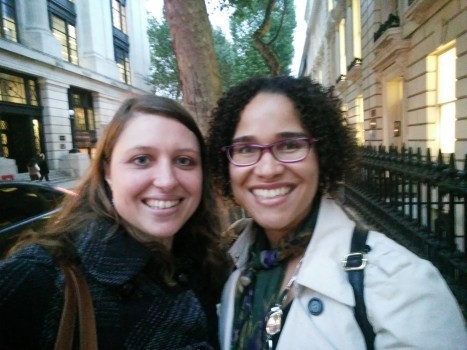 Was I really in London just a week ago? This photo arrived yesterday from Alice Curry, publisher at Lantana Books. We met for coffee last Monday before I gave a “talk without tech” to some exchange students from Skidmore College. It was wonderful being interviewed by Raymi, who did a close reading of The Ghosts in the Castle. I don’t miss London as much, but do find I’m clearing my plate with a stronger sense of urgency. I don’t like multitasking but it’s an inevitable feature of our lives these days. I try to close tabs and empty my inbox as soon as possible, and it felt good last night to revise and send out my “Nice Is Not Enough” essay. Scratch that off the list! Today I got my flu shot. I ran some errands, got some steps in, and sent my designer final edits for THE PHANTOM UNICORN. I’ve been exchanging emails all morning with my uncle up in Canada; we’re collaborating on a picture book about how he learned to play hockey in the 1960s. I’m about to send my editor notes on the first round of interior illustrations for DRAGONS IN A BAG, and then I should be able to pick up where I left off with THE DRAGON THIEF. I woke up earlier this week thinking of a poem—a lament, an apology—for Thanksgiving. But I can’t work on that right now…every project’s got to get in line! Otherwise my plate will never be clear.
Was I really in London just a week ago? This photo arrived yesterday from Alice Curry, publisher at Lantana Books. We met for coffee last Monday before I gave a “talk without tech” to some exchange students from Skidmore College. It was wonderful being interviewed by Raymi, who did a close reading of The Ghosts in the Castle. I don’t miss London as much, but do find I’m clearing my plate with a stronger sense of urgency. I don’t like multitasking but it’s an inevitable feature of our lives these days. I try to close tabs and empty my inbox as soon as possible, and it felt good last night to revise and send out my “Nice Is Not Enough” essay. Scratch that off the list! Today I got my flu shot. I ran some errands, got some steps in, and sent my designer final edits for THE PHANTOM UNICORN. I’ve been exchanging emails all morning with my uncle up in Canada; we’re collaborating on a picture book about how he learned to play hockey in the 1960s. I’m about to send my editor notes on the first round of interior illustrations for DRAGONS IN A BAG, and then I should be able to pick up where I left off with THE DRAGON THIEF. I woke up earlier this week thinking of a poem—a lament, an apology—for Thanksgiving. But I can’t work on that right now…every project’s got to get in line! Otherwise my plate will never be clear.
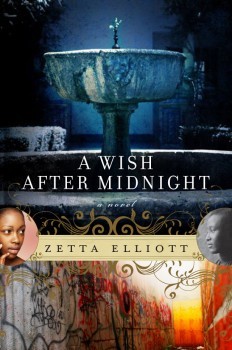 A WISH AFTER MIDNIGHT is on promotion for the month of November; the e-book is just 99 cents. If you think terrorism in NYC began on 9/11, you might want to think again. The horrific truck attack in lower Manhattan this week won’t stop New Yorkers from living their lives; we’re resilient and so were the New Yorkers who survived the Draft Riots of 1863. But many African Americans left after the riots, and that’s how I’m feeling right now—enough. We talked about Maritcha Lyons in my workshop at Weeksville last weekend and how she left, fought for access to education in Providence, RI, only to return to Brooklyn to serve the Black community as an educator and activist. There’s a connection between Weeksville and England, something I need to explore. I’ve got too many ideas in my head right now! Okay, time for another walk and then it’s back to work…
A WISH AFTER MIDNIGHT is on promotion for the month of November; the e-book is just 99 cents. If you think terrorism in NYC began on 9/11, you might want to think again. The horrific truck attack in lower Manhattan this week won’t stop New Yorkers from living their lives; we’re resilient and so were the New Yorkers who survived the Draft Riots of 1863. But many African Americans left after the riots, and that’s how I’m feeling right now—enough. We talked about Maritcha Lyons in my workshop at Weeksville last weekend and how she left, fought for access to education in Providence, RI, only to return to Brooklyn to serve the Black community as an educator and activist. There’s a connection between Weeksville and England, something I need to explore. I’ve got too many ideas in my head right now! Okay, time for another walk and then it’s back to work…
November 1, 2017
no relief
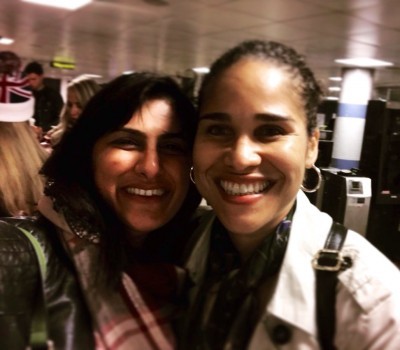 Usually I come back to NYC and sigh with relief. But that hasn’t been happening lately. When I returned from London last Friday night, the city looked run down. Folks were acting up on the subway, and everything just felt loud and dirty and chaotic. I went to Weeksville the next morning and there was more chaos on the train, but then I had a sweet young writer in my workshop on witnessing the Civil War and I thought to myself, “Give it time.” But the next day, I updated my CV and applied for two jobs—one in Scotland and one in DC. I know that if I leave Brooklyn now, I’ll probably never be able to come back; gentrification will continue and I’ll be
Usually I come back to NYC and sigh with relief. But that hasn’t been happening lately. When I returned from London last Friday night, the city looked run down. Folks were acting up on the subway, and everything just felt loud and dirty and chaotic. I went to Weeksville the next morning and there was more chaos on the train, but then I had a sweet young writer in my workshop on witnessing the Civil War and I thought to myself, “Give it time.” But the next day, I updated my CV and applied for two jobs—one in Scotland and one in DC. I know that if I leave Brooklyn now, I’ll probably never be able to come back; gentrification will continue and I’ll be 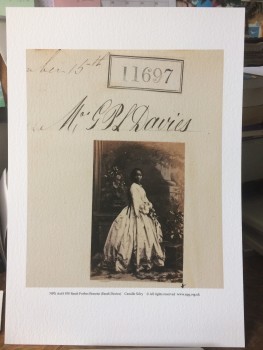 priced out of the rental market for good. But I don’t think that holding on is good for me—best to choose a new destination rather than wait to be displaced. Everything was so EASY in the UK. For the first time, I experienced train delays and broken down lifts (the Tube is WAY underground, so a broken elevator’s a big deal—no stairs). But I made all my connections and kept dates with friends despite my phone not picking up Wifi while I was out and about. I was warmly received at the four schools where I presented and sold over twenty books. Didn’t open my umbrella once during my six-day stay, and got a lovely print of Sarah Forbes Bonetta at the National Portrait Gallery before heading back to NYC. I now know quite a few people in London and I’ve got friends in Cambridge, too. It was interesting to talk with the Americans about their adjustment to British culture. One US grad student at Cambridge gave me a hug during the Q&A and her British peer later said, “That’s the most un-British thing ever—it made me blush!” Some friends talked about feeling isolated and
priced out of the rental market for good. But I don’t think that holding on is good for me—best to choose a new destination rather than wait to be displaced. Everything was so EASY in the UK. For the first time, I experienced train delays and broken down lifts (the Tube is WAY underground, so a broken elevator’s a big deal—no stairs). But I made all my connections and kept dates with friends despite my phone not picking up Wifi while I was out and about. I was warmly received at the four schools where I presented and sold over twenty books. Didn’t open my umbrella once during my six-day stay, and got a lovely print of Sarah Forbes Bonetta at the National Portrait Gallery before heading back to NYC. I now know quite a few people in London and I’ve got friends in Cambridge, too. It was interesting to talk with the Americans about their adjustment to British culture. One US grad student at Cambridge gave me a hug during the Q&A and her British peer later said, “That’s the most un-British thing ever—it made me blush!” Some friends talked about feeling isolated and 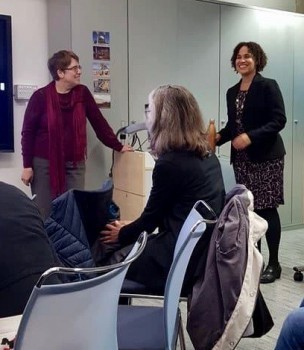 homesick precisely because of that British reserve, and I would feel nervous giving up my network here in the US (though I maintain much of it via social media). But I wanted to prove I could survive as a full-time writer and I’ve done that for a few years now (just). It’s time to think long-term. I looked at my CV and I’ve been living an academic life, in a way; hopefully some school somewhere might give me credit for all the essays I’ve written and the talks I’ve given and the books I’ve published. I miss teaching. A lot. UK indie author Wendy Hue captured this image of me at Cambridge and I look as happy and relaxed as I felt. I taught a writing workshop for teens on my birthday but we had mostly adults in the room. And they wrote some amazing poetry and shared some touching memories. My hosts wanted to know when I’d be back so we could collaborate on another event. There is demand for what I do. I just have to find a way to make a living doing it…
homesick precisely because of that British reserve, and I would feel nervous giving up my network here in the US (though I maintain much of it via social media). But I wanted to prove I could survive as a full-time writer and I’ve done that for a few years now (just). It’s time to think long-term. I looked at my CV and I’ve been living an academic life, in a way; hopefully some school somewhere might give me credit for all the essays I’ve written and the talks I’ve given and the books I’ve published. I miss teaching. A lot. UK indie author Wendy Hue captured this image of me at Cambridge and I look as happy and relaxed as I felt. I taught a writing workshop for teens on my birthday but we had mostly adults in the room. And they wrote some amazing poetry and shared some touching memories. My hosts wanted to know when I’d be back so we could collaborate on another event. There is demand for what I do. I just have to find a way to make a living doing it…
October 16, 2017
coast to coast
 Ten days ago I was in California; we had beautiful blue skies and sunshine, and no fear of the smoke now blowing over the Bay Area as fires rage in the northern part of the state. I went to San Francisco to participate in the Teaching for Social Justice conference and it was fantastic. My friends initially thought we’d form a panel but in the end, everyone was out of town except me and Matthew (center) and a few other indie author friends: Innosanto Nagara, Laurin Mayeno, and Jill Guerra. We hung out on Thursday and then on Friday I got to meet Allison Kenny, founder of
Ten days ago I was in California; we had beautiful blue skies and sunshine, and no fear of the smoke now blowing over the Bay Area as fires rage in the northern part of the state. I went to San Francisco to participate in the Teaching for Social Justice conference and it was fantastic. My friends initially thought we’d form a panel but in the end, everyone was out of town except me and Matthew (center) and a few other indie author friends: Innosanto Nagara, Laurin Mayeno, and Jill Guerra. We hung out on Thursday and then on Friday I got to meet Allison Kenny, founder of 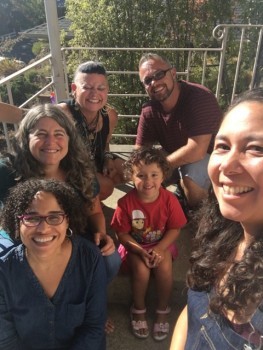 Go Girls and a fellow indie author. That evening I went to Oakland to hang out with Rob Liu-Trujillo and finally got to meet his wife Joy who designed this awesome website. Their home is full of beautiful artwork, and Rob shared his vision of an indie-creator collective. I wasn’t feeling great so spent the rest of the night on my own in Laura’s peaceful apartment, and then woke up early for the conference the next day. My morning workshop, “Everyone Has a Story to Tell: Students & Self-Publishing,” was full of engaged educators and ALL the tech worked (I’d been stressing about it for weeks). I had enough handouts, I sold over 20 books, and then made my way to the airport using public transit. I felt autonomous and fully functional in the Bay Area and that’s usually how I feel in London. I’m a little stressed out about the 3 talks I’ll be giving around the UK, but I’ll be among friends and that makes all the difference. We have a lovely flyer for the event at Cambridge University, and here are links with more info about my events at UCL and Newcastle. If you know folks in the UK, please let them know all my events are free and open to the public. I’ve already met an indie author in London—check out BookLove!
Go Girls and a fellow indie author. That evening I went to Oakland to hang out with Rob Liu-Trujillo and finally got to meet his wife Joy who designed this awesome website. Their home is full of beautiful artwork, and Rob shared his vision of an indie-creator collective. I wasn’t feeling great so spent the rest of the night on my own in Laura’s peaceful apartment, and then woke up early for the conference the next day. My morning workshop, “Everyone Has a Story to Tell: Students & Self-Publishing,” was full of engaged educators and ALL the tech worked (I’d been stressing about it for weeks). I had enough handouts, I sold over 20 books, and then made my way to the airport using public transit. I felt autonomous and fully functional in the Bay Area and that’s usually how I feel in London. I’m a little stressed out about the 3 talks I’ll be giving around the UK, but I’ll be among friends and that makes all the difference. We have a lovely flyer for the event at Cambridge University, and here are links with more info about my events at UCL and Newcastle. If you know folks in the UK, please let them know all my events are free and open to the public. I’ve already met an indie author in London—check out BookLove!
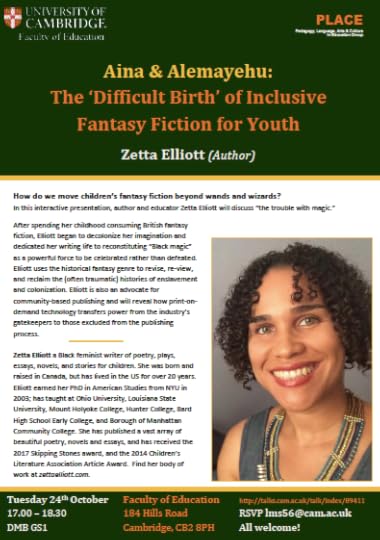 When I got home from the Bay Area, I received an invitation to write an op-ed for the NY Times. I’m not sure they’ll end up publishing it, but I was happy to scratch one more item off my Summer Writing Agenda (one item left: The Dragon Thief). The Phantom Unicorn is in production, and I got another extension from my Random House editor so November will be all about dragons in Brooklyn. When I get back from the UK, I’ll be leading this free writing workshop at Weeksville Heritage Center. Join us if you can!
When I got home from the Bay Area, I received an invitation to write an op-ed for the NY Times. I’m not sure they’ll end up publishing it, but I was happy to scratch one more item off my Summer Writing Agenda (one item left: The Dragon Thief). The Phantom Unicorn is in production, and I got another extension from my Random House editor so November will be all about dragons in Brooklyn. When I get back from the UK, I’ll be leading this free writing workshop at Weeksville Heritage Center. Join us if you can!

